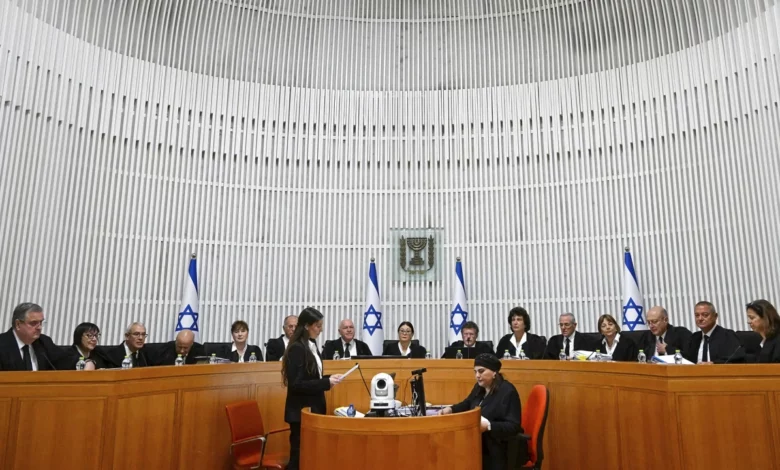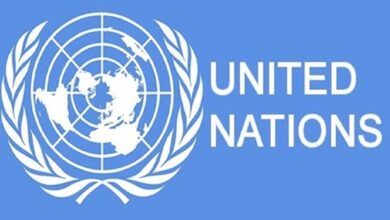
Meanwhile, watching and worrying from the sidelines, many Palestinians fear a weakened Supreme Court could lead to the expansion of Jewish settlements in the occupied West Bank and the eventual annexation of the territory they want for a future state.
Most Israelis have cited the erosion of democracy and human rights in protesting the overhaul, but its potential implications on more than three million Palestinians living under Israeli occupation in the West Bank haven’t played a significant part in the public discourse.
Sawsan Zaher, a Palestinian citizen of Israel and human rights lawyer working with the Legal Center for Arab Minority Rights in Israel, argues the implications could be enormous. She refers to the overhaul as a “judicial coup,” saying it risks facilitating the “de facto annexation of the West Bank without any critique or any review” from the Supreme Court.
Zaher’s concern is rooted in words and actions that Netanyahu government has taken since coming into power at the end of last year. The cabinet includes a number of West Bank settlers in powerful positions, and the agreement that brought together the government calls for extending Israel’s sovereignty in the West Bank, effectively a call for annexation.
Under Netanyahu’s far-right government, Israel has approved a record number of housing units in West Bank settlements, Peace Now said in a July report.
Most countries and the United Nations consider the West Bank and East Jerusalem as occupied and therefore view Israeli settlements there as illegal under international law. Israel says the territory is disputed and denies its settlements there are illegal.
Many Israelis support their government’s expansion into the occupied territories. A 2020 survey by the Jerusalem-based Israel Democracy Institute found that more than half of Jewish Israelis supported extending Israeli sovereignty in the West Bank, an ambition that Netanyahu has voiced.
The overhaul includes a number of bills, the first of which passed in July by a 64-0 vote, thanks to the entire opposition walking out in protest before the vote. That law strips the Supreme Court of the power to declare government decisions unreasonable.
Supporters of the overhaul say that the judicial system in Israel is flawed, and gives too much power to the court. Some have been calling for judicial reform for years, saying it would balance all three branches of government.
Last week, the Supreme Court heard challenges to the reasonableness law, with the entire panel of 15 judges convening for the first time ever to hear a case.
Justices grilled lawyers from both sides rigorously, giving little indication which way they would rule. It is unclear when the court will announce its decision on the reasonableness law.
The ruling could be historic, since the reasonableness law is an amendment to one of Israel’s 13 Basic Laws. Unlike many democracies, Israel doesn’t have a written constitution. Instead, it relies on Basic Laws, as well as court ruling precedents that could one day become a constitution. The court has never struck down a Basic Law or an amendment to one.
“If you look at the core essence and intentions of the judicial coup, it is basically to stop the Supreme Court from having any kind of judicial review on Basic Laws or government decisions,” Zaher told CNN.
A narrow avenue for legal recourse
Experts say that while the Supreme Court has generally supported Israel’s settlement expansion, it has sometimes provided a narrow avenue for legal recourse by Palestinians.
Eliav Lieblich, a law professor at Tel Aviv University said the court has never hindered the settlement movement. “It never ruled on the overall legality of the settlement projects.”
What it did do, he said, is “provide specific protections for situations in which private property of Palestinians has been infringed, or otherwise used for settlements,” Lieblich told CNN.
But Zaher said that Palestinians have never considered the Supreme Court as sympathetic to their cause, and that Netanyahu’s overhaul risks scrapping any remaining mechanisms, no matter how small, that can override policies viewed by Palestinians as violations of their rights.
“Did the Supreme Court protect Palestinian rights in the West Bank? The answer clearly is that in 95% of cases, no,” Zaher estimated.
Palestinians in the West Bank fall under a different set of laws than Israelis. They are subject to the jurisdiction of multiple, separate authorities, including the Palestinian Authority and Israeli military laws. West Bank Palestinians have the option of petitioning Israeli courts to rule against evictions, demolitions or land seizures, even if there’s a slim chance of success.
According to human rights organizations, the Supreme Court approves the majority of the orders for demolition of the family homes of Palestinians engaged in attacks against Israelis, and rarely grants petitions filed by Palestinians against those measures. The practice has been criticized by rights groups as collective punishment. Israel argues that it deters future attacks.
Palestinians have however had some rare victories. In 2005, the Supreme Court ordered the government to come up with a new route for part of its security barrier in the northern West Bank to minimize hardship for Palestinians. The International Court of Justice in The Hague had said a year earlier that the entire barrier is illegal.
And in 2012, Israel’s Supreme Court ruled in favor of a group of Palestinian landowners, ordering the removal of five settler buildings in the West Bank above the Palestinian village of Dura al-Qara.
More recently in 2017, Israeli security forces bulldozed nine homes built on private Palestinian land in the West Bank settlement of Ofra. The decision to destroy the homes came after the High Court of Justice struck down an appeal by the settler residents of Ofra to evacuate the homes but not destroy them. The court had issued the demolition ruling in 2015, seven years after the legal aid group representing the Palestinian landowner filed the case in 2008.
In other cases, however, rulings in favor of Palestinians have been reversed. Last year, in an unprecedented move, the high court ruled that a settlement outpost – Israeli housing in the West Bank built without government authorization – on private Palestinian land can remain place, almost two years after ordering its removal.
Fears of ‘speedy’ annexation
Palestinians say that settlement expansion under the Netanyahu government suggests there will be even less restraint on expansion when the Supreme Court is no longer a bureaucratic hurdle for the government.
There may be “an acceleration of the annexation in a speedy way that we did not see before,” Zaher said.
Ahmed Tibi, a Palestinian-Israeli member of Israel’s parliament and head of the Ta’al party, said that supporters of the reasonableness law include far-right ministers Bezalel Smotrich and Itamar Ben Gvir, both of whom are settlers. These supporters, Tibi said, “aim to control the judicial system to facilitate the annexation of occupied territories.”
“Many suggestions (in the judicial overhaul) would benefit the settlers,” Tibi told CNN. “Anything that strengthens the settlers tends to weaken the Palestinians.”
Gershon Baskin, director of the Holy Land Bond, a new investment fund aimed at investing in housing projects for Palestinians in East Jerusalem, sees settlement expansions as being at the heart of Netanyahu’s judicial plan.
“The small avenues that Palestinians have found within the Israeli High Court are going to be closed doors in the not-too-distant future if Netanyahu is successful in pushing through the reform,” Baskin said.
While the formal annexation of the West Bank is “an extreme scenario,” Lieblich said, it would be easier to do if the Supreme Court is severely weakened, with no authority to review government decisions. Weakening judicial review would also make it easier to take incremental steps that could amount to annexation for all practical purposes, he said.
“Once you diminish judicial review, you empower the executive, in what is already a zero-sum game (between Israel and the Palestinians),” he added.




